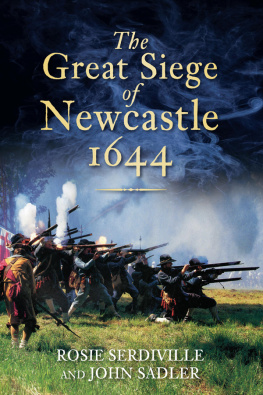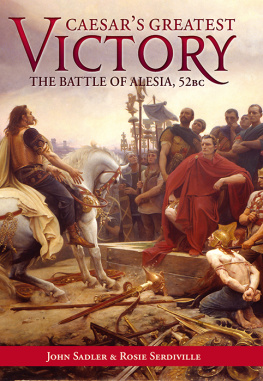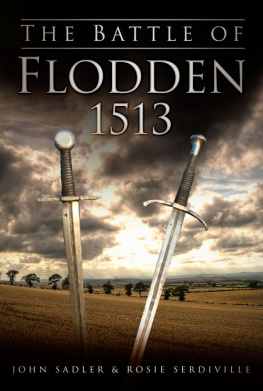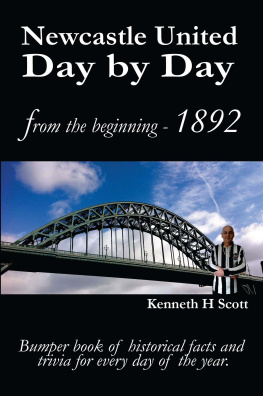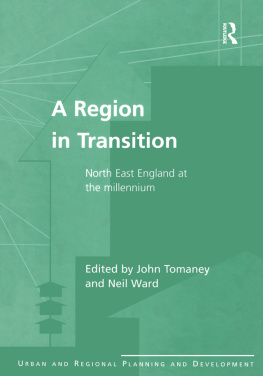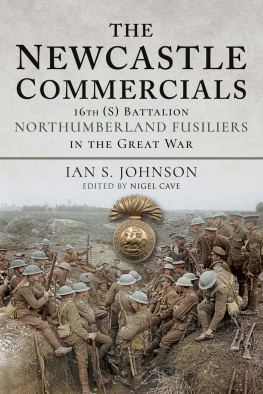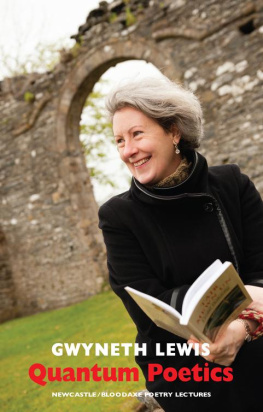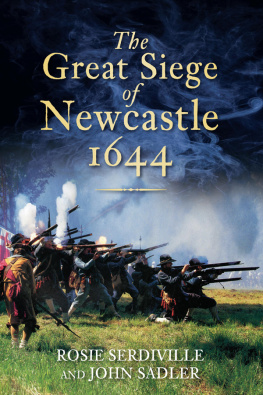The
Great Siege
of
Newcastle
1644
The
Great Siege
of
Newcastle
1644

ROSIE SERDIVILLE
AND JOHN SADLER

Dedicated to all Time Bandits, past and present
Cry, valiant soldiers, laid not your arms,
Listen to the whispers of the night.
Look into your heart and seek,
Find the truth and fight.
Let not your courage be meek.
Like the lion roar.
Worthy your part play, comrades, when battle has begun,
Loosen the dogs of war.
Death shall be your only song,
And like the brave, shall leave their mark in a lonely grave.
Jennifer Laidler
First published 2011
The History Press
The Mill, Brimscombe Port
Stroud, Gloucestershire, GL5 2QG
www.thehistorypress.co.uk
This ebook edition first published in 2013
All rights reserved
Rosie Serdiville and John Sadler, 2011, 2013
The right of Rosie Serdiville and John Sadler to be identified as the Author of this work has been asserted in accordance with the Copyright, Designs and Patents Act 1988.
This ebook is copyright material and must not be copied, reproduced, transferred, distributed, leased, licensed or publicly performed or used in any way except as specifically permitted in writing by the publishers, as allowed under the terms and conditions under which it was purchased or as strictly permitted by applicable copyright law. Any unauthorised distribution or use of this text may be a direct infringement of the authors and publishers rights, and those responsible may be liable in law accordingly.
EPUB ISBN 978 0 7509 5349 8
Original typesetting by The History Press
Contents
Preface
As a boy, youth and young man, one of the co-authors spent many hours inside Newcastle Keep, that great dark tower so anachronistically placed, surrounded by the rush and consequence of a much later and dismissive era. It has withstood several centuries of Scottish raiders, their Tudor reiver descendants, the ravaging of civil wars, a brash Industrial Revolution and the neglect of contemptuous progress. Relatively few medieval citadels survive in our major cities, the White Tower of London being almost certainly the grandest.
Newcastles keep was already old when King Charles I raised his standard at Nottingham in that distant summer of 1642, thereby igniting a conflict that would rage and then splutter for another eighteen years till, after a vast effusion of blood and treasure, his son ascended a throne vacant since the regicide of 1649. It would be reasonable to assert that none of those who embarked upon the course of civil strife intended, at that point, to kill the King and establish a republic. Their aims were far more conservative and the vast majority of Parliamentarians would have recoiled from being tarred by any revolutionary brush. It was intended that the royal prerogative be curtailed, rather than cut off. None who marched in the early days behind Parliaments banner had any notion of redistributing wealth. The wars were fought more for control than for radical change. Many would be astonished by the changes strife engendered, less than happy with the consequences and the rise of radical sectaries. Many would be surprised by their own actions few of the regicides, for example, would have ever contemplated at the outset that they might feel themselves finally driven down such a path. We should not lose sight of the fact that, considering the size of our population in the mid-seventeenth century, the Civil Wars took, pro rata, a worse toll than even the First World War.
The Great Siege and Storming of Newcastle in the autumn of 1644 was an important episode in significant period during the First Civil War (164246) and yet it is one which is largely forgotten. This modern study of the siege seeks to shed light upon the nature of polity and division within urban communities and how local factors influenced and shaped allegiances. In the case of Newcastle this led to a tragic and ultimately futile campaign that could have only one outcome. It is said that the term Geordies was coined during a later conflict, the 1715 Jacobite Rebellion, when the Newcastle miners and artisans were so universally Whig in sentiment they drowned out calls for King James with cheers for King George or Geordie. This appears a fundamental shift from the position some sixty years earlier when the city was so resolutely held for the exiled Stuarts father. Yet the situation on Tyneside during the Civil Wars was by no means as clear cut or so demonstrably partisan as might, at first glance, appear to be the case.
The late Professor Terry, who published a series of erudite papers in Archaeologia Aeliana in the closing years of the nineteenth century and was a distinguished scholar who had done much work on the army of the Covenanters, provided a detailed study of the primary source material. An interesting local work had earlier been complied in 1889 and subsequently reprinted in 1932 under the title The Siege and Storming of Newcastle. Most of the recent writers on the military aspects of the Civil Wars have neglected both the winter campaign in the north east during those early snowbound months of 1644 and the subsequent autumn siege and storming. Even Gardiner in his great history, provides us with scant detail. A more recent and local historian, Stuart Reid, who is a constant and accomplished student of the pike and shot era, has written a carefully researched and lucid account of the campaigns of 1644 but does not shed light upon the subsequent siege.
For the enthusiast and collector of battlefields the city holds many traces, some of which still rise unscathed from the post-industrial detritus around. The Civil War tour is more fully discussed in . This co-author can claim to have had a long association of involvement with the Keep as both father and father-in-law were representatives of the Society of Antiquaries with responsibility for fabric and collections and he spent some school summers in anorak heaven cleaning and displaying arms and armour. Without that, perhaps this history might not have been written.
Acknowledgements
Thanks are due from the authors to Anna Flowers and colleagues from Newcastle City Libraries, Colm O Brien and other colleagues at the North East Centre For Lifelong Learning, Nicky Clarke and members of the Society of Antiquaries of Newcastle upon Tyne, the staff of the Great North Museum, the Literary and Philosophical Society of Newcastle upon Tyne, Liz Ritson, Jo Raw and staff at Woodhorn County Museum and Archive, Adam Goldwater and Gillian Dean of Tyne and Wear Museums, Bill Griffiths of the Museums Hub, Tony Ball of Newcastle Keep, Robert Cowper, the late Professor George Jobey, the late Alec Bankier, Charles Wesencraft, Dr Jo Bath, Bill and Diane Pickard, Sarah-Jayne Goodfellow, Diane Trevena, Doug Chapman, Tony Hall and Lyn Dodds, to Adam Barr for the photographs, Jennifer Laidler for the verse extracts and Chloe Rodham for the maps; another successful collaboration. For all errors and omissions the authors remain, as ever, responsible.
Quotes from Napoleons maxims are taken from the late Dr David Chandlers The Military Maxims of Napoleon (Greenhill: London, 2002).
All pictures are from the authors collection unless otherwise stated.
Timeline
162539
June 1625 Charles I of England marries Catholic Henrietta Maria, daughter of Henry IV of France
May 1626 Charles dismisses Parliament
March 1628 Parliament recalled; issue of the Thirty Nine Articles
7 June 1628 Petition of Right
Next page
